人教精通版小学六年级英语下册期末知识汇总
完整版小学英语人教精通版六年级下册重点归纳
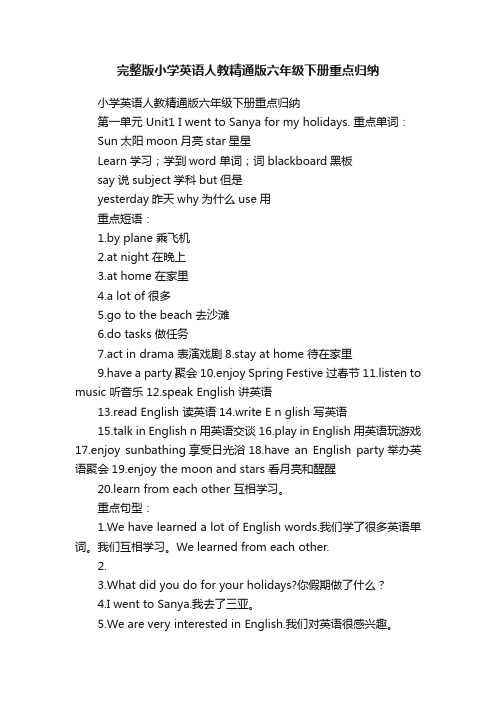
完整版小学英语人教精通版六年级下册重点归纳小学英语人教精通版六年级下册重点归纳第一单元 Unit1 I went to Sanya for my holidays. 重点单词:Sun太阳moon月亮star星星Learn学习;学到word 单词;词blackboard黑板say 说subject学科but但是yesterday昨天why为什么use用重点短语:1.by plane 乘飞机2.at night 在晚上3.at home 在家里4.a lot of 很多5.go to the beach 去沙滩6.do tasks 做任务7.act in drama 表演戏剧8.stay at home 待在家里9.have a party 聚会10.enjoy Spring Festive 过春节11.listen to music 听音乐12.speak English 讲英语13.read English 读英语14.write E n glish 写英语15.talk in English n用英语交谈16.play in English 用英语玩游戏17.enjoy sunbathing享受日光浴18.have an English party举办英语聚会19.enjoy the moon and stars 看月亮和醒醒20.learn from each other 互相学习。
重点句型:1.We have learned a lot of English words.我们学了很多英语单词。
我们互相学习。
We learned from each other.2.3.What did you do for your holidays?你假期做了什么?4.I went to Sanya.我去了三亚。
5.We are very interested in English.我们对英语很感兴趣。
6.How did you learn English?你(们)是怎么学英语的?7.We learned English by doing things.我们通过做事情来学英语。
人教精通版小学六年级英语下册期末考试知识总结

人教精通版小学六年级英语下册期末考试
知识总结
本文档对人教精通版小学六年级英语下册期末考试知识进行总结,旨在帮助学生复和备考。
1. 词汇与拼写
本节主要总结下册中重要的单词和拼写规则。
- 研究新单词的正确拼写。
- 复已学单词的拼写和词义。
2. 语法
本节主要总结下册中涉及的语法知识点。
- 时态:一般现在时、一般过去时和一般将来时。
- 句型结构:陈述句、疑问句和否定句。
- 代词:人称代词、物主代词、指示代词等。
- 数量词:用于表示数量的词语。
3. 阅读理解
本节主要总结下册中的阅读理解部分。
- 阅读短文,理解短文内容。
- 回答与短文相关的问题。
- 根据短文填写信息或选择正确的答案。
4. 口语与写作
本节主要总结下册中涉及的口语和写作知识。
- 口头表达能力:运用已学的句型和单词进行口头表达。
- 书面表达能力:根据题目要求写出一篇对话或短文。
5. 音标与发音
本节主要总结下册中的音标和常见的发音规则。
- 掌握音标的发音和书写。
- 根据单词的发音规则正确读音。
6. 其他技能
本节主要总结下册中的其他技能。
- 听力技巧:听懂对话和短文,回答相应问题。
- 句子翻译:将中文句子翻译成英文,或将英文句子翻译成中文。
希望以上总结能够帮助学生顺利备考并取得好成绩。
祝大家考试顺利!。
人教版六年级下册英语知识点
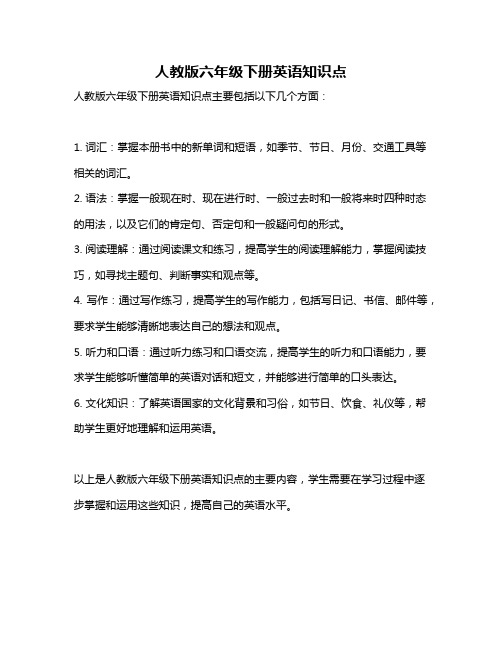
人教版六年级下册英语知识点
人教版六年级下册英语知识点主要包括以下几个方面:
1. 词汇:掌握本册书中的新单词和短语,如季节、节日、月份、交通工具等相关的词汇。
2. 语法:掌握一般现在时、现在进行时、一般过去时和一般将来时四种时态的用法,以及它们的肯定句、否定句和一般疑问句的形式。
3. 阅读理解:通过阅读课文和练习,提高学生的阅读理解能力,掌握阅读技巧,如寻找主题句、判断事实和观点等。
4. 写作:通过写作练习,提高学生的写作能力,包括写日记、书信、邮件等,要求学生能够清晰地表达自己的想法和观点。
5. 听力和口语:通过听力练习和口语交流,提高学生的听力和口语能力,要求学生能够听懂简单的英语对话和短文,并能够进行简单的口头表达。
6. 文化知识:了解英语国家的文化背景和习俗,如节日、饮食、礼仪等,帮助学生更好地理解和运用英语。
以上是人教版六年级下册英语知识点的主要内容,学生需要在学习过程中逐步掌握和运用这些知识,提高自己的英语水平。
人教版六年级英语下册知识点梳理完整版

人教版六年级英语下册知识点梳理HEN system office room 【HEN16H-HENS2AHENS8Q8-HENH1688】六年级英语下册知识点梳理Unit 1 How tall are you?一、单元内容简析:本单元内容的中心话题是询问人或事物的年龄、身高、重量以及长度并作比较。
内容涉及恐龙、猴子以及鲸类的比较,学生之间在年龄、身高和体重方面的比较。
1、数字的读法,含有“厘米、千克”单位的读法。
如百以上164:one hundred and sixty-four,学生可能读的时候百后不知加“and”,还有千的读法:thousand,小数的读法等。
2、形容词比较级的用法与变化形式,哪些要双写,哪些要把y变i成再加er,到底在什么情况下变比较级要加上more。
3、代词的用法,特别是名词性物主代词的用法。
四、易考点与易错点:1、词语类:①四会词语在听力部分听写或笔试部分按照汉意写词语。
②按要求写词语:变比较级funny,heavy,big,thin;long的名词,foot,tooth复数,heavy(heavier)的反义词light(er)③very修饰原级,much修饰比较级。
例如:He is very tall. He is much taller than you.2、语法、句型类:①How引导的不同特殊疑问句:How be sb.(问某人状况),How tall/heavy/old be sb./sth(询问身高、体重、年龄)How long/big/large be---(问多长、多大)How many/much(问数量、价格)。
②比较级的运用,一定要是相同内容或类别才可以进行比较,这是学生最易出错和混淆娥地方。
例如:Mike’s legs are longer than (John),如果学生翻译会直接填写John,但是一分析就不难发现应该和John的腿作比较的,所以应该是John’s。
精通英语六年级下知识点

精通英语六年级下知识点六年级下英语知识点:精通英语一、单词拼写1. celebration (庆祝)The whole school gathered in the playground for the New Year celebration.2. adventure (冒险)The children went on an exciting adventure in the deep forest.3. instrument (乐器)Tom plays the piano and his sister plays the violin. They both love musical instruments.4. geography (地理)In geography class, we learn about different countries and their landscapes.5. community (社区)We should work together to build a harmonious community.二、语法规则1. 一般现在时We use the simple present tense to talk about something that happens regularly or is a fact. For example:- My brother always plays basketball on Sundays.- Water boils at 100 degrees Celsius.2. 一般过去时We use the simple past tense to talk about something that happened in the past. For example:- Yesterday, I went to the park with my friends.- Last summer, we traveled to Japan.3. 现在进行时We use the present continuous tense to talk about an action happening now or in the near future. For example:- She is reading a book at the moment.- They are going to the beach tomorrow.4. 名词单复数In English, most nouns form their plural by adding "s" to the end of the word. For example:- One book, two books- A cat, three cats5. 形容词比较级和最高级We use comparative and superlative forms of adjectives to compare or describe things. For example:- This book is more interesting than that one.- The blue bird is the most beautiful bird in the world.三、阅读理解1. 阅读短文,选择正确答案Read the following passage and choose the correct answer:Yesterday was my birthday. My parents bought me a beautiful gift. It's a new bicycle! I was so excited. In the afternoon, I rode my bicycle to the park with my friends. We had a lot of fun playing games and having a picnic. It was a perfect birthday.- What did the parents buy for the writer?- A. A new book- B. A new bicycle- C. A new toyAnswer: B. A new bicycle2. 阅读短文,回答问题Read the following passage and answer the questions:Sarah is a student from England. She is in Grade 6. She can speak English and French very well. She loves playing the piano and oftenplays for her classmates during school events. Sarah also enjoys reading books and playing basketball. Her dream is to become a famous pianist one day.- Where is Sarah from?- What languages can she speak?- What does Sarah enjoy doing besides playing the piano?- What is Sarah's dream?Answer:- Sarah is from England.- She can speak both English and French.- Sarah enjoys reading books and playing basketball.- Her dream is to become a famous pianist.四、写作技巧1. 写人物介绍When writing about a person, it's important to mention their name, age, hobbies, and dreams. Use adjectives to describe the person's personality and appearance. For example:My best friend, Lisa, is a cheerful and kind-hearted girl. She is twelve years old and has long, curly hair. Lisa loves playing the guitar and dreams of becoming a famous singer one day.2. 描述地点When describing a place, start with an introductory sentence and then provide more details about the location, its features, and what activities are available there. For example:The beach is a beautiful and relaxing place. It is located by the seaside and has soft, golden sand. People can swim, sunbathe, and build sandcastles at the beach. The sound of the waves and the fresh sea breeze create a peaceful atmosphere.以上是六年级下英语知识点的简要介绍。
人教精通版六年级英语下册各单元知识点汇总
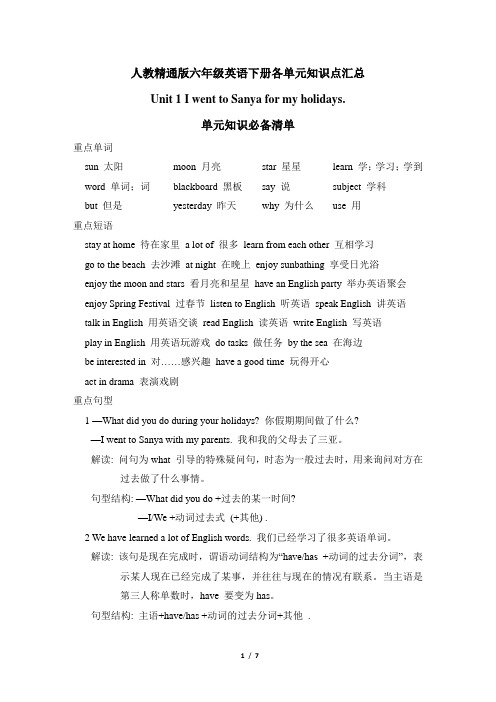
人教精通版六年级英语下册各单元知识点汇总Unit 1 I went to Sanya for my holidays.单元知识必备清单重点单词sun 太阳moon 月亮star 星星learn 学;学习;学到word 单词;词blackboard 黑板say 说subject 学科but 但是yesterday 昨天why 为什么use 用重点短语stay at home 待在家里a lot of 很多learn from each other 互相学习go to the beach 去沙滩at night 在晚上enjoy sunbathing 享受日光浴enjoy the moon and stars 看月亮和星星have an English party 举办英语聚会enjoy Spring Festival 过春节listen to English 听英语speak English 讲英语talk in English 用英语交谈read English 读英语write English 写英语play in English 用英语玩游戏do tasks 做任务by the sea 在海边be interested in 对……感兴趣have a good time 玩得开心act in drama 表演戏剧重点句型1 —What did you do during your holidays? 你假期期间做了什么?—I went to Sanya with my parents. 我和我的父母去了三亚。
解读: 问句为what 引导的特殊疑问句,时态为一般过去时,用来询问对方在过去做了什么事情。
句型结构: —What did you do +过去的某一时间?—I/We +动词过去式(+其他) .2 We have learned a lot of English words. 我们已经学习了很多英语单词。
(完整word版)小学英语人教精通版六年级下册重点归纳,推荐文档
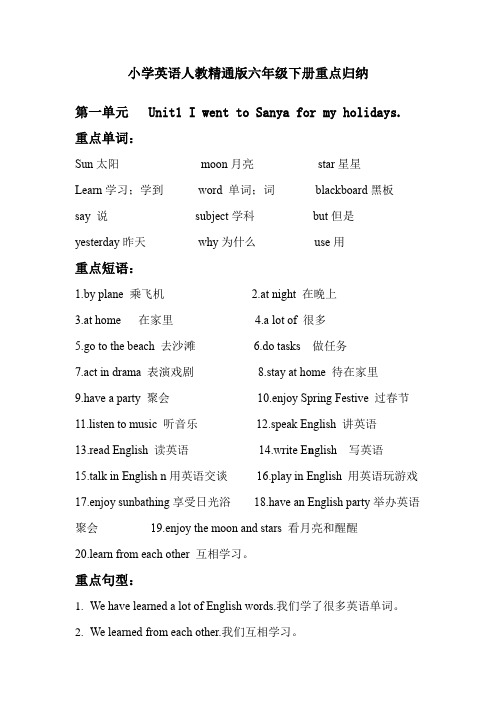
小学英语人教精通版六年级下册重点归纳第一单元 Unit1 I went to Sanya for my holidays. 重点单词:Sun太阳moon月亮star星星Learn学习;学到word 单词;词blackboard黑板say 说subject学科but但是yesterday昨天why为什么use用重点短语:1.by plane 乘飞机2.at night 在晚上3.at home 在家里4.a lot of 很多5.go to the beach 去沙滩6.do tasks 做任务7.act in drama 表演戏剧8.stay at home 待在家里9.have a party 聚会10.enjoy Spring Festive 过春节11.listen to music 听音乐12.speak English 讲英语13.read English 读英语14.write E n glish 写英语15.talk in English n用英语交谈16.play in English 用英语玩游戏17.enjoy sunbathing享受日光浴18.have an English party举办英语聚会19.enjoy the moon and stars 看月亮和醒醒20.learn from each other 互相学习。
重点句型:1.We have learned a lot of English words.我们学了很多英语单词。
2.We learned from each other.我们互相学习。
3.What did you do for your holidays?你假期做了什么?4.I went to Sanya.我去了三亚。
5.We are very interested in English.我们对英语很感兴趣。
6.How did you learn English?你(们)是怎么学英语的?7.We learned English by doing things.我们通过做事情来学英语。
人教精通英语六年级下3--4知识点梳理
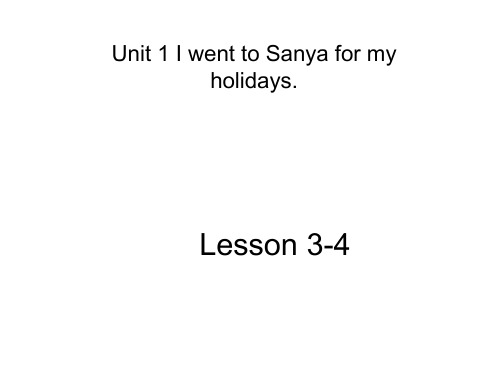
4、three years ago
三年前
5、have learned 已经学会(现在完成时)
6、a lot of 许多、大量 +可数名词复数 +不可数名词
7、use (动词)使用 ;use sth. to do sth. (用… 做…)
例句:I used my mother’s computer to do my homework yesterday. 8、in and out of class 课内外
16、read English 读英语
17、talk in English 用英语交谈
18、play in English 用英语玩
just practise
Homework
Unit 1 I went to Sanya for my holidays.
Lesson 3-4
单
learn
词
学习、学到
a lot of
word
很多
单词、词
blackboard
say
黑板
说
课 文 重 点
1、I‘d like =I would like= want
2、tell (动词)告诉 tell sb. to do sth. tell sb. not to do sth. 3、begin to do sth. 开始做某事 tell sb. about sth.
9、be interested in +名词
+doing
对生活
11、ask(动词) 问、让;
ask sb. to do sth. 让某人做某事
12、do tasks
13、in English
做任务
(完整版)小学六年级人教版英语总复习及知识点
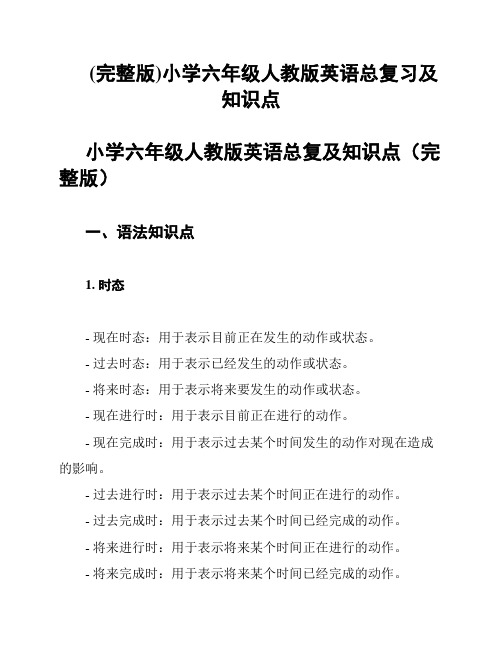
(完整版)小学六年级人教版英语总复习及知识点小学六年级人教版英语总复及知识点(完整版)一、语法知识点1. 时态- 现在时态:用于表示目前正在发生的动作或状态。
- 过去时态:用于表示已经发生的动作或状态。
- 将来时态:用于表示将来要发生的动作或状态。
- 现在进行时:用于表示目前正在进行的动作。
- 现在完成时:用于表示过去某个时间发生的动作对现在造成的影响。
- 过去进行时:用于表示过去某个时间正在进行的动作。
- 过去完成时:用于表示过去某个时间已经完成的动作。
- 将来进行时:用于表示将来某个时间正在进行的动作。
- 将来完成时:用于表示将来某个时间已经完成的动作。
2. 语法结构- 名词:用于表示人、动物、物体、地点等。
- 动词:用于表示动作或状态。
- 形容词:用于描述名词的特征或状态。
- 副词:用于修饰动词、形容词或其他副词。
- 介词:用于表示位置、时间或关系等。
- 代词:用于替代名词。
- 数词:用于表示数量。
- 冠词:用于限定名词的范围。
- 连词:用于连接词语、短语或句子。
3. 句子结构- 主语:句子中执行动作或承受动作的人或事物。
- 谓语:句子中说明主语动作或状态的部分。
- 宾语:句子中接受动作的人或事物。
- 定语:用于修饰名词或代词的成分。
- 状语:用于修饰动词、形容词、副词或整个句子的成分。
- 表语:用于说明主语的状态或特征的部分。
二、总复内容1. 单词- 请根据教材中的单词表,复并牢记相关的单词拼写和意思。
2. 句子- 复教材中的对话和句子,理解并掌握其基本意思和用法。
3. 对话- 复教材中的对话,掌握其中的日常生活用语和表达方式。
4. 语法- 复教材中的语法知识点,加深对时态、语法结构和句子成分的理解。
三、研究方法1. 多听多说- 多听英语教材、歌曲或英语广播,提高听力水平。
- 多说英语,练口语表达和语音准确性。
2. 多读多写- 多读英语教材、故事书等,提高阅读理解能力。
- 多写英语作文,锻炼自己的写作能力和语法运用。
完整版)小学英语人教精通版六年级下册重点归纳
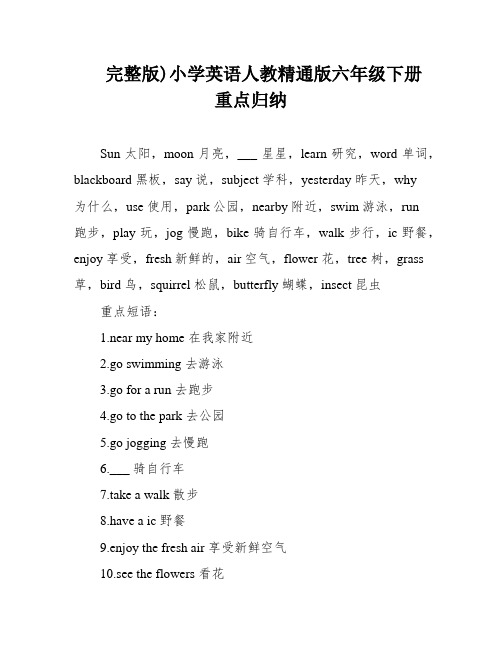
完整版)小学英语人教精通版六年级下册重点归纳Sun 太阳,moon 月亮,___ 星星,learn 研究,word 单词,blackboard 黑板,say 说,subject 学科,yesterday 昨天,why为什么,use 使用,park 公园,nearby 附近,swim 游泳,run跑步,play 玩,jog 慢跑,bike 骑自行车,walk 步行,ic 野餐,enjoy 享受,fresh 新鲜的,air 空气,flower 花,tree 树,grass 草,bird 鸟,squirrel 松鼠,butterfly 蝴蝶,insect 昆虫重点短语:1.near my home 在我家附近2.go swimming 去游泳3.go for a run 去跑步4.go to the park 去公园5.go jogging 去慢跑6.___ 骑自行车7.take a walk 散步8.have a ic 野餐9.enjoy the fresh air 享受新鲜空气10.see the flowers 看花11.climb the trees 爬树12.lie on the grass 躺在草地上13.watch the birds 看鸟14.feed the squirrels 喂松鼠15.chase the butterflies 追蝴蝶16.catch the insects 捉昆虫重点句型:1.There is a park near my home。
我家附近有个公园。
2.I like to go swimming in the summer。
我喜欢在夏天去游泳。
3.We can go for a run in the morning。
我们可以在早上去跑步。
4.Let's go to the park and play。
让我们去公园玩吧。
5.___我喜欢在公园里慢跑。
6.I often ___ 我经常骑自行车去公园。
人教精通版六年级英语下册各单元知识点汇总

人教精通版六年级英语下册各单元知识点汇总Unit 1 I went to Sanya for my holidays.单元知识必备清单重点单词sun 太阳moon 月亮star 星星learn 学;学习;学到word 单词;词blackboard 黑板say 说subject 学科but 但是yesterday 昨天why 为什么use 用重点短语stay at home 待在家里a lot of 很多learn from each other 互相学习go to the beach 去沙滩at night 在晚上enjoy sunbathing 享受日光浴enjoy the moon and stars 看月亮和星星have an English party 举办英语聚会enjoy Spring Festival 过春节listen to English 听英语speak English 讲英语talk in English 用英语交谈read English 读英语write English 写英语play in English 用英语玩游戏do tasks 做任务by the sea 在海边be interested in 对……感兴趣have a good time 玩得开心act in drama 表演戏剧重点句型1 —What did you do during your holidays? 你假期期间做了什么?—I went to Sanya with my parents. 我和我的父母去了三亚。
解读: 问句为what 引导的特殊疑问句,时态为一般过去时,用来询问对方在过去做了什么事情。
句型结构: —What did you do +过去的某一时间?—I/We +动词过去式(+其他) .2 We have learned a lot of English words. 我们已经学习了很多英语单词。
人教精通版小学英语六年级下册总复习课件ppt
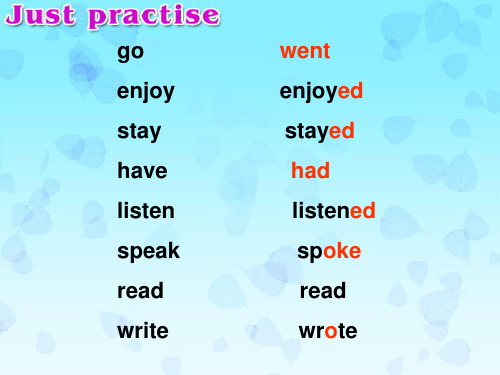
A.little B.few
C.lot
经营者提供商品或者服务有欺诈行为 的,应 当按照 消费者 的要求 增加赔 偿其受 到的损 失,增 加赔偿 的金额 为消费 者购买 商品的 价款或 接受服 务的费 用
十一、小练笔。 请你写一篇日记。
内容提示:假设今天是3月16日,星期日,你上午和 朋友一起去看电影、玩足球,下午和妈妈一起去逛街, 并买了一本新故事书,晚上回家看书。这一天你过得很 愉快。
经营者提供商品或者服务有欺诈行为 的,应 当按照 消费者 的要求 增加赔 偿其受 到的损 失,增 加赔偿 的金额 为消费 者购买 商品的 价款或 接受服 务的费 用
八、按要求完成下列各题。
1. they(反身代词)__t_h_e_m_s_e__lv_e_s 2.of course (同义词)____s_u__r _____
七、根据答句写问句。 1.— __W_h_e_r_e__ __w_e_r_e___ ____y_ou last year? —I was in Beijing last year. 2.—___H__ow___ ____w_a_s__ ___y_o_u_r__ holiday? —My holiday was interesting. 3.—___D_i_d___ ___s_h_e___go to Sanya? —Yes,she did.
人教版英语六年级下册知识点1-3单元
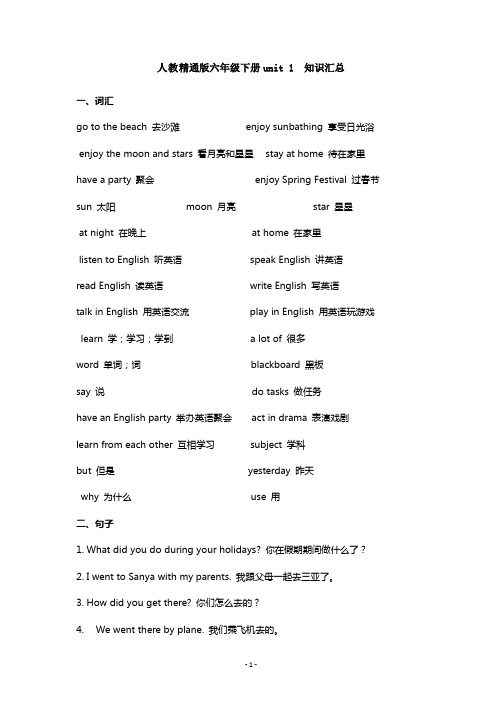
人教精通版六年级下册unit 1 知识汇总一、词汇go to the beach 去沙滩enjoy sunbathing 享受日光浴 enjoy the moon and stars 看月亮和星星stay at home 待在家里have a party 聚会 enjoy Spring Festival 过春节sun 太阳 moon 月亮star 星星at night 在晚上at home 在家里listen to English 听英语speak English 讲英语read English 读英语write English 写英语talk in English 用英语交流play in English 用英语玩游戏learn 学;学习;学到 a lot of 很多word 单词;词blackboard 黑板say 说do tasks 做任务have an English party 举办英语聚会 act in drama 表演戏剧learn from each other 互相学习subject 学科but 但是 yesterday 昨天why 为什么use 用二、句子1.What did you do during your holidays? 你在假期期间做什么了?2.I went to Sanya with my parents. 我跟父母一起去三亚了。
3.How did you get there? 你们怎么去的?4.We went there by plane. 我们乘飞机去的。
5. Did you have a good time? 你玩得开心吗?6.We enjoyed sunbathing during the day, and we enjoyed the moon and stars at night. 我们白天享受日光浴,晚上欣赏月亮和星星。
7.We are very interested in English. 我们对英语很感兴趣。
英语精通版六年级知识点
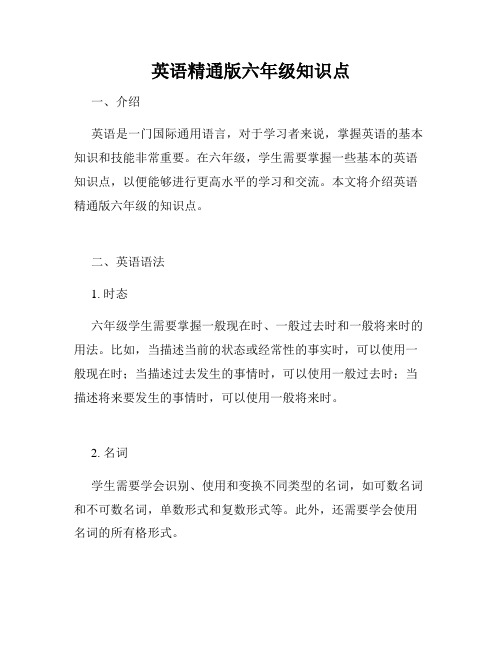
英语精通版六年级知识点一、介绍英语是一门国际通用语言,对于学习者来说,掌握英语的基本知识和技能非常重要。
在六年级,学生需要掌握一些基本的英语知识点,以便能够进行更高水平的学习和交流。
本文将介绍英语精通版六年级的知识点。
二、英语语法1. 时态六年级学生需要掌握一般现在时、一般过去时和一般将来时的用法。
比如,当描述当前的状态或经常性的事实时,可以使用一般现在时;当描述过去发生的事情时,可以使用一般过去时;当描述将来要发生的事情时,可以使用一般将来时。
2. 名词学生需要学会识别、使用和变换不同类型的名词,如可数名词和不可数名词,单数形式和复数形式等。
此外,还需要学会使用名词的所有格形式。
3. 动词动词是句子中最重要的成分之一,学生需要学会使用不同类型的动词,如行为动词、非行为动词、不规则动词等。
此外,还需要掌握动词的时态变化和主谓一致的规则。
4. 形容词和副词形容词和副词用于修饰名词和动词,学生需要学会选择合适的形容词和副词,并掌握它们的比较级和最高级形式。
5. 介词和连词介词和连词在句子中起着连接作用,使句子更加流畅。
学生需要学会使用一些常见的介词和连词,如in、on、at、but、and等。
三、英语单词1. 词汇量六年级学生应该具备一定的词汇量,能够灵活运用各类单词进行表达和交流。
学生可以通过阅读、写作和背单词等方式扩大自己的词汇量。
2. 单词拼写除了掌握单词的意思,学生还需要学会正确拼写各类单词。
可以通过拼写练习和记忆常用单词的拼写规则来提高拼写能力。
四、阅读理解阅读理解是英语学习的重要部分,学生需要学会从文章中获取信息,理解作者的观点和意图,并回答相关问题。
可以通过大量的阅读来提高阅读理解能力。
五、口语表达与听力能力在六年级,学生需要提高英语口语表达和听力能力。
可以通过与同学或老师进行英语口语对话,听英语音频或观看英语视频来提高口语表达和听力能力。
六、写作技巧六年级学生需要学会使用一些写作技巧,如使用恰当的句式、过渡词、连接词等来使文章结构清晰、语言流畅。
人教版六年级下册英语知识点总结

六年级下册英语知识点总结英语也是与电脑联系最密切的语言,大多数编程语言都与英语有联系,而且随着网络的使用,使英文的使用更普及。
下面是小编整理的关于英语知识点总结,欢迎大家参考!第一单元一、单词young—younger更年轻的old -older更年长的tall- taller更高的short-shorter更矮的long-longer更长的thin-thinner更瘦的heavy-heavier更重的big-bigger更大的small -smaller更小的strong -stronger更强壮的二、句子1. That's the tallest dinosaur in this hall. 那是这个厅里最高的恐龙。
2. You're older than me.你比我大。
3. How tall are you? 你有多高? I'm 1.65 meters.我身高1.65米。
4. What size are your shoes?你穿多大号的鞋。
5. My shoes are size37.我穿37号的`鞋。
6. Your feet are bigger than mine.你的脚比我的大。
7. How heavy are you?你有多重?8. I'm 48 kilograms.我体重48公斤。
三、语法复习要点形容词的比较级1、形容词比较级在句子中的运用:两个事物或人的比较用比较级,比较级后面一般带有单词than。
than后的人称代词用主格(口语中可用宾格)。
2.形容词加er的规则:⑴一般在词尾加er ;⑵以字母e 结尾,加r ;nice---nicer⑶以一个元音字母和一个辅音字母结尾,应双写末尾的辅音字母,再加er ;big--- bigger thin---- thinner⑷以“辅音字母+y”结尾,先把y变i,再加er 。
heavy----heavier3.不规则形容词比较级:good/well-better例句:(1).It's taller than both of us together.它比我俩加起来还高。
六年级下册英语重点知识总结人教版
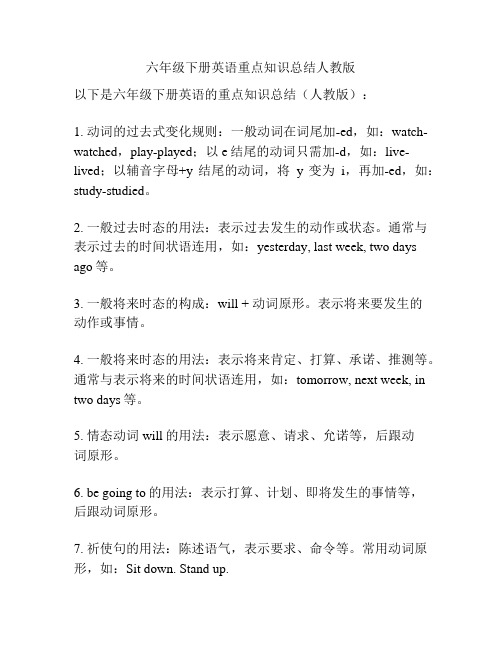
六年级下册英语重点知识总结人教版以下是六年级下册英语的重点知识总结(人教版):1. 动词的过去式变化规则:一般动词在词尾加-ed,如:watch-watched,play-played;以e结尾的动词只需加-d,如:live-lived;以辅音字母+y结尾的动词,将y变为i,再加-ed,如:study-studied。
2. 一般过去时态的用法:表示过去发生的动作或状态。
通常与表示过去的时间状语连用,如:yesterday, last week, two days ago等。
3. 一般将来时态的构成:will + 动词原形。
表示将来要发生的动作或事情。
4. 一般将来时态的用法:表示将来肯定、打算、承诺、推测等。
通常与表示将来的时间状语连用,如:tomorrow, next week, in two days等。
5. 情态动词will的用法:表示愿意、请求、允诺等,后跟动词原形。
6. be going to的用法:表示打算、计划、即将发生的事情等,后跟动词原形。
7. 祈使句的用法:陈述语气,表示要求、命令等。
常用动词原形,如:Sit down. Stand up.8. 情态动词can的用法:表示能力、允许等。
后跟动词原形。
9. 情态动词must的用法:表示必须、必然等。
后跟动词原形。
10. 情态动词should的用法:表示应该、建议等。
后跟动词原形。
11. 句型:What do you want to be? I want to be a(n) ______. 用于表达自己的职业理想。
12. 句型:Do you have any plans for the weekend? 用于询问对周末是否有计划。
13. 物主代词的用法:用于表示所有关系,如:my, your, his, her, its, our, their等。
14. 基数词与序数词的区别:基数词表示数量,如:one, two, three等;序数词表示顺序,如:first, second, third等。
小学英语人教精通版六年级下册重点归纳复习进程

小学英语人教精通版六年级下册重点归纳第一单元 Unit1 I went to Sanya for my holidays. 重点单词:Sun太阳moon月亮star星星Learn学习;学到word 单词;词blackboard黑板say 说subject学科but但是yesterday昨天why为什么use用重点短语:1.by plane 乘飞机2.at night 在晚上3.at home 在家里4.a lot of 很多5.go to the beach 去沙滩6.do tasks 做任务7.act in drama 表演戏剧8.stay at home 待在家里9.have a party 聚会10.enjoy Spring Festive 过春节11.listen to music 听音乐12.speak English 讲英语13.read English 读英语14.write E n glish 写英语15.talk in English n用英语交谈16.play in English 用英语玩游戏17.enjoy sunbathing享受日光浴18.have an English party举办英语聚会19.enjoy the moon and stars 看月亮和醒醒20.learn from each other 互相学习。
重点句型:1.We have learned a lot of English words.我们学了很多英语单词。
2.We learned from each other.我们互相学习。
3.What did you do for your holidays?你假期做了什么?4.I went to Sanya.我去了三亚。
5.We are very interested in English.我们对英语很感兴趣。
6.How did you learn English?你(们)是怎么学英语的?7.We learned English by doing things.我们通过做事情来学英语。
(完整版)人教版六年级英语下册知识点梳理
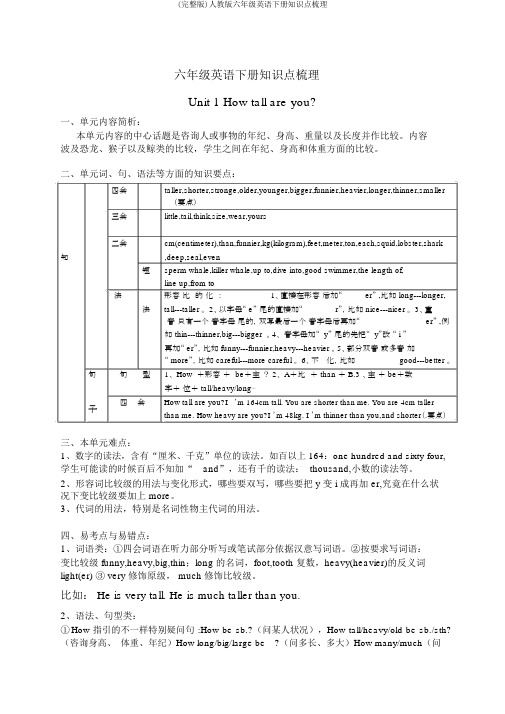
六年级英语下册知识点梳理Unit 1 How tall are you?一、单元内容简析:本单元内容的中心话题是咨询人或事物的年纪、身高、重量以及长度并作比较。
内容波及恐龙、猴子以及鲸类的比较,学生之间在年纪、身高和体重方面的比较。
二、单元词、句、语法等方面的知识要点:四会taller,shorter,stronge,older,younger,bigger,funnier,heavier,longer,thinner,smaller(要点)三会little,tail,think,size,wear,yours二会cm(centimeter),than,funnier,kg(kilogram),feet,meter,ton,each,squid,lobster,shark 知,deep,seal,even短sperm whale,killer whale,up to,dive into,good swimmer,the length of,line up,from to法句句形容比的化:1、直接在形容后加“er” ,比如 long---longer,法tall---taller 。
2、以字母“ e” 尾的直接加“r”,比如 nice---nicer 。
3、重音只有一个音字母尾的,双写最后一个音字母后再加“er” ,例如 thin---thinner,big---bigger 。
4、音字母加“ y” 尾的先把“ y”改“ i ”再加“ er”,比如 funny---funnier,heavy---heavier 。
5、部分双音或多音加“ more”,比如 careful---more careful 。
6、不化,比如good---better 。
型1、 How +形容+ be+主? 2、 A+比+ than + B.3 、主+ be+数字+位+ tall/heavy/long⋯四会How tall are you?I’m 164cm tall. You are shorter than me. You are 4cm taller 子than me. How heavy are you?I ’m 48kg. I ’m thinner than you,and shorter(.要点)三、本单元难点:1、数字的读法,含有“厘米、千克”单位的读法。
人教精通版小学六年级英语下册期末知识汇总
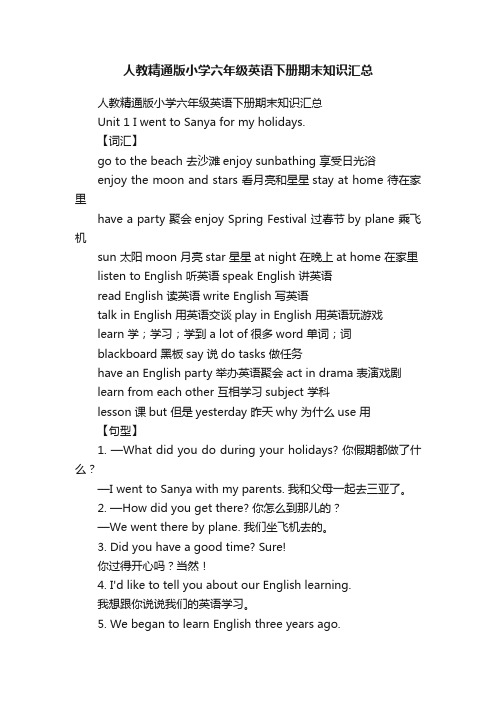
人教精通版小学六年级英语下册期末知识汇总人教精通版小学六年级英语下册期末知识汇总Unit 1 I went to Sanya for my holidays.【词汇】go to the beach 去沙滩enjoy sunbathing 享受日光浴enjoy the moon and stars 看月亮和星星stay at home 待在家里have a party 聚会enjoy Spring Festival 过春节by plane 乘飞机sun 太阳moon 月亮star 星星at night 在晚上at home 在家里listen to English 听英语speak English 讲英语read English 读英语write English 写英语talk in English 用英语交谈play in English 用英语玩游戏learn 学;学习;学到 a lot of很多word 单词;词blackboard 黑板say 说do tasks 做任务have an English party 举办英语聚会act in drama 表演戏剧learn from each other 互相学习subject 学科lesson 课but 但是yesterday 昨天why 为什么use 用【句型】1. —What did you do during your holidays? 你假期都做了什么?—I went to Sanya with my parents. 我和父母一起去三亚了。
2. —How did you get there? 你怎么到那儿的?—We went there by plane. 我们坐飞机去的。
3. Did you have a good time? Sure!你过得开心吗?当然!4. I'd like to tell you about our English learning.我想跟你说说我们的英语学习。
六年级下英语知识点精通

六年级下英语知识点精通六年级下英语是学生们学习英语的最后一年,也是巩固和提升英语能力的关键时期。
本文将为大家详细讲解六年级下英语的重要知识点,帮助同学们在这个阶段掌握英语的核心内容。
一、语法知识点1. 时态:六年级下英语中时态的运用至关重要。
特别是以下几个时态,同学们需要注意:a. 一般现在时:用于描述常态、习惯或经常发生的动作。
例如,“I eat breakfast every day.”b. 一般过去时:用于描述发生在过去的动作或状态。
例如,“She watched a movie last night.”c. 一般将来时:用于表示将来某个时间发生的动作。
例如,“We will go to the park tomorrow.”2. 从句:从句是句子中的一部分,并且不能独立成句。
在六年级下英语中,主要有以下几种从句:a. 定语从句:用来修饰名词或代词。
例如,“The book that is on the table is mine.”b. 名词性从句:作为主语、宾语或表语。
例如,“What she said is true.”c. 状语从句:用来修饰动词、形容词或副词。
例如,“He left the classroom when the bell rang.”3. 句型转换:句型转换是提高英语表达能力的有效方法。
我们需要掌握各种句型转换的规则,如肯定句转否定句、一般疑问句转特殊疑问句等等。
二、词汇知识点1. 词义辨析:六年级下英语中,会涉及一些词义相近或易混淆的词汇。
例如,“heavy”和“weighty”都可以表示“重的”,但在使用时有所不同。
我们要学会辨析这些词汇,避免使用错误的词汇。
2. 同义词和反义词:提升词汇量是扩大口语和写作表达能力的关键。
同义词和反义词的学习可以帮助我们丰富词汇储备。
例如,“cheap”和“inexpensive”是同义词,“hot”和“cold”是反义词。
3. 常用短语:六年级下英语中,会有一些常用的短语。
- 1、下载文档前请自行甄别文档内容的完整性,平台不提供额外的编辑、内容补充、找答案等附加服务。
- 2、"仅部分预览"的文档,不可在线预览部分如存在完整性等问题,可反馈申请退款(可完整预览的文档不适用该条件!)。
- 3、如文档侵犯您的权益,请联系客服反馈,我们会尽快为您处理(人工客服工作时间:9:00-18:30)。
人教精通版小学六年级英语下册期末知识汇总Unit 1 I went to Sanya for my holidays.【词汇】go to the beach 去沙滩enjoy sunbathing 享受日光浴enjoy the moon and stars 看月亮和星星stay at home 待在家里have a party 聚会enjoy Spring Festival 过春节by plane 乘飞机sun 太阳moon 月亮star 星星at night 在晚上at home 在家里listen to English 听英语speak English 讲英语read English 读英语write English 写英语talk in English 用英语交谈play in English 用英语玩游戏learn 学;学习;学到 a lot of很多word 单词;词blackboard 黑板say 说do tasks 做任务have an English party 举办英语聚会act in drama 表演戏剧learn from each other 互相学习subject 学科lesson 课but 但是yesterday 昨天why 为什么use 用【句型】1. —What did you do during your holidays? 你假期都做了什么?—I went to Sanya with my parents. 我和父母一起去三亚了。
2. —How did you get there? 你怎么到那儿的?—We went there by plane. 我们坐飞机去的。
3. Did you have a good time? Sure!你过得开心吗?当然!4. I'd like to tell you about our English learning.我想跟你说说我们的英语学习。
5. We began to learn English three years ago.我们三年前开始学习英语。
6. We are very interested in English. 我们对英语非常感兴趣。
7. We have learned a lot of English words.我们学习了很多英语单词。
8. —What did we learn in the first year?第一年我们学了什么?—We learned many new words and used them.我们学了很多新单词并且使用它们。
9. —How did you learn English? 你怎样学习英语?—We learned English by doing things. 我们通过做事学习英语。
—We learned from each other. 我们互相学习。
【语法知识】1. during 和for 的辨析during 在……期间,表示动作发生在这段期间的某一点或整段时间。
for 只表示动作的持续,表示持续多长时间例:I was ill for a week and during the week I didn’t go to work.我病了一周,在这期间我没去工作。
2. by + 交通工具,表示“乘坐……”例:by bike,by car,by bus,by train,by subway,by plane / air , by ship /sea等,但“步行”为on foot3. take sb to + 地点,意为“把某人带到某地”例:Would you like to take me to your school?你愿意带我去你的学校吗?拓展:用某些动词短语来表示交通方式。
如:walk to:步行去;drive to :开车去;ride to :骑马/车去;fly to :乘飞机去。
注意:如果后面接地点副词here , there , home,介词to应省去。
4. enjoy oneself = have a good/great time = have fun玩得高兴,过得愉快5. teach的拓展①teach sb. sth.教某人某事例:Mr Wang teaches us history this term. 王老师这学期教我们历史。
②teach sb. to do sth.教某人做某事例:Susan often teaches me to read English. 苏珊经常教我读英语。
6. tell sb sth.告诉某人某事tell sb. to do sth.告诉某人去做某事tell sb. about sth.给某人讲述某事7. talk to sb. 和talk with sb. (与……谈话)①talk to sb.强调一方主动和另一方去谈话例:Don’t talk to him, because he is doing his homework.别和他谈话,他在写作业呢。
②talk with sb.强调双方在谈话8. help的用法help sb with sth 在某方面帮助某人例:He usually helps me with my lessons. 他通常在学习上帮助我。
help sb (to) do sth 帮助某人做某事例:We are going to help Mrs. Li (to) clean the room.我们打算去帮李女士打扫房间。
help to do sth 帮着去做某事例:He never helps to set the dinner table.他从不帮着摆放餐桌。
9. interesting 有趣的例:This story is interesting. 这个故事真有趣。
be interested in + 名词/doing sth. 对......感兴趣例:He is interested in music. 他对音乐感兴趣。
10. 表示时间频率的副词(按频率由高到底排序)always 总是usually通常often 经常sometimes 有时seldom 很少,不常hardly难得, 几乎从来不never决不, 从未Unit 2 There is a park near my home.【词汇】bank 银行in front of 在……前面bookshop 书店behind 在……后面hotel 宾馆clothes shop 服装店supermarket 超市across the road 在马路对面hospital 医院river 河流near 在……附近beside 在……旁边between 在……中间healthy (food)健康的(食品) vegetable 蔬菜go down this street 顺着这条街走turn right at the tragic lights 交通灯处右转cross the street 穿过马路street大街;街道turn right/left 右转/左转on the right/left 在右边/左边minute 分钟;一会儿City Library 城市图书馆restaurant 饭店post office 邮局by bike 骑自行车by subway 乘地铁on foot 步行half an hour 半小时city 城市library 图书馆【句型】1. There is a park near my home and there is a river behind the park.我家附近有一个公园,公园后有一条河。
2. There are a lot of trees and flowers in the park.公园里有好多树和花。
3. —Where are you going? 你要去哪?—I want to go to the bookshop. 我想去书店。
4. —But where is it? 但是它在哪?—Go down this street and turn right at the traffic lights. Then you can see the bookshop on the left.沿着这条街走,在交通灯右转。
然后你能在左边看到书店。
5. —How long does it take to go there on foot?走路到那需要多长时间?—Only a few minutes. 只需要几分钟。
6. —Excuse me. How can I get to the City Library?不好意思。
我怎么能去城市图书馆?—You can go there by No. 6 bus. 你可以做6路公车过去。
7. —Is it far from here? 离这远吗?—No, it's about half an hour by bus. 不,坐公交大概半小时。
8. —Thank you! 谢谢!—My pleasure! 我的荣幸!9. —Thanks a lot! 非常感谢!—You're welcome! 不客气!【语法知识】1. ①in front of 在物体外部的前面例:There are some trees in front of the building.②in the front of在物体内部的前面例:There is a desk in the front of the classroom.2. 问路①How can I get to the + 地点?②Where is the + 地点?③Can you tell me the way to the+ 地点?3. There be 句型(表示“在……有……”)(1)基本结构:①There is + 单数可数名词或不可数名词+ 其他.②There are + 复数可数名词+ 其他.例:There is a book on the desk. 在书桌上有一本书。
There are some birds in the tree. 在树上有些鸟。
另外要注意:当句子中出现几个并列的主语时,be动词要与靠近的主语的数上保持一致。
区别这两个句子:There is a girl and some boys in the classroom.There are some boys and a girl in the classroom.(2)There be 句型的时态变化①一般现在时:There is /There are...②一般将来时: A.肯定句:There will be /There is goingto be/ There are going to be...B.否定句:There won’t be…/There isn’t going to be…/ There aren’t going to be…。
